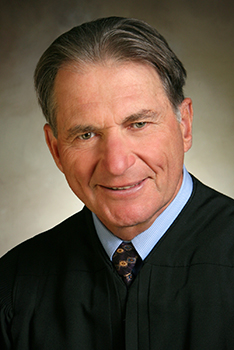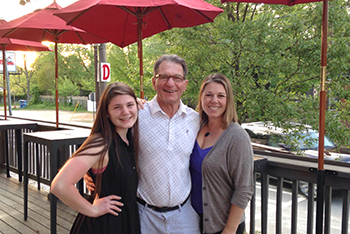 July 15, 2015 – In 1978, at the age of 32, Richard Brown was an up-and-coming litigator in Oshkosh. Becoming a judge was the farthest thing from his mind. Now, 37 years later, Judge Brown is retiring as one of the longest-serving judges in Wisconsin history.
July 15, 2015 – In 1978, at the age of 32, Richard Brown was an up-and-coming litigator in Oshkosh. Becoming a judge was the farthest thing from his mind. Now, 37 years later, Judge Brown is retiring as one of the longest-serving judges in Wisconsin history.
Elected to District II of the newly established Wisconsin Court of Appeals in 1978, Judge Brown is the only remaining member of that original 16-judge court.
In 2007, the Wisconsin Supreme Court appointed Brown to serve as chief judge. On Aug. 1, he’ll retire, passing the baton to incoming Chief Appeals Court Judge Lisa Neubauer, appointed to take his place.
“Judge Brown is one of Wisconsin’s finest judges,” said Judge Neubauer, who has served on the District II Appeals Court with Judge Brown since 2007. “For those of us who have been privileged to serve with him, he sets the standard to which we all aspire.”
As Judge Brown reflects on a 37-year judicial career, he recalls the joys and the obstacles, including the challenge of losing his hearing in his mid-30s. In addition, some of Judge Brown's colleagues reflect on his career, offering insight about Judge Brown's opinion-writing and leadership abilities.
“I Don’t Want to Be a Judge”
Born and raised in Racine, Brown had legal aspirations at an early age. His father, Manny Brown, was a prominent Racine attorney and a state senator from 1965 to 1971.
Brown earned an undergraduate degree from Miami University in Ohio before obtaining his law degree from U.W. Law School in 1971. He served as an assistant district attorney in Racine for two years before joining a law firm in Oshkosh, where he ultimately became a partner. He was doing well as a commercial litigator.
“I was developing a good reputation in the Fox River Valley as a litigator, making good money. And I was happy with my practice,” Chief Judge Brown recalled. “I enjoyed it.”

Chief Appeals Court Judge Richard Brown in Maryland with his son, Ben, and two grandchildren, Daniel (left) and Zachary.
In 1977, judges and lawyers began plans to run for the newly created Wisconsin Court of Appeals, with two-year, four-year, and six-year terms available to start in 1978.
Winnebago County Circuit Court Judge William Crane and Racine County Circuit Court Judge Dennis Flynn both announced plans to run for a four-year term in District II.
However, both later dropped out unexpectedly. Judge Flynn, who babysat Brown in childhood, phoned Brown and urged him to run instead.
“Why would I want to do that?” Brown remembers asking Flynn. “I said, I’m 32 years old, I’m a partner in a law firm, and I’m busy with a lucrative practice. I’m a litigator, and this is exactly what I wanted to do all my life. I simply have no interest in being a judge.”
Flynn conceded, for a moment. Then he phoned Brown again an hour later. Flynn said he’d been talking to his uncle, a democratic state legislator like Brown’s father, and Flynn’s uncle also thought Brown should run.
“I said Dennis, didn’t you hear me the first time? I don’t want to be a judge,” Brown recalled telling Flynn. “He said, politically speaking, I could win. But I said I didn’t care about that. I wasn’t going to run and that was it. We left it at that.”
“Judge Brown is one of Wisconsin’s finest judges” – Judge Neubauer
It was Jan. 3, 1978, a Monday. Brown was set for a jury trial. He went to the courthouse to pick a jury, and a reporter for the Oshkosh Daily Northwestern was standing at the door. “I heard you are running for the court of appeals,” he said.
Brown asked what he was talking about. “It’s all over the courthouse,” the reporter said. Brown confirmed the talk as rumors and said he had no interest in running. He went to pick the jury. The judge, Edmund Arpin, walked up to Brown with encouraging words.
“He said, ‘boy that’s great move. You are going to win.’ I said, ‘Judge, I don’t know where you heard that, but I’m not running for the court of appeals. I’m just not doing it.’”
After jury selection, Brown headed back to his office to prepare for that afternoon’s trial. “Two of the other partners were standing at my door, arms crossed,” Brown recalled. “I said, ‘I know you heard I’m running for the court of appeals, but it’s not true.’”
But the partners thought Brown should run. It would be good for the firm, they said. Once again, Brown informed them that the information was false. He wasn’t running.
 Joe Forward, Saint Louis Univ. School of Law 2010, is a legal writer for the State Bar of Wisconsin, Madison. He can be reached by email or by phone at (608) 250-6161.
Joe Forward, Saint Louis Univ. School of Law 2010, is a legal writer for the State Bar of Wisconsin, Madison. He can be reached by email or by phone at (608) 250-6161.
“To make a long story short, by Friday, I changed my mind,” Brown said. “Maybe it was the flattery, I don’t know. I later found out that Dennis’s uncle had spread it to the legislators in Madison, and the legislators from Oshkosh brought it back.”
Brown went on to win a primary, and faced Sheboygan County Circuit Court Judge John Buchen in the general election in April, 1978. Brown pulled ahead in the middle of the night.
“My dad called around two in the morning,” Brown recalled. “He said it was close, but I was pulling ahead. The outstanding votes were in Washington, Racine, and Kenosha counties. “You are going to win those,” Brown recalled his father saying.
Around 5 a.m., Brown went out and sat on his front porch. “I was a smoker back then,” he said. “I made a promise to myself that if I won, I would quit smoking. And I’m out on the front steps smoking my last cigarette thinking, ‘I don’t know how this happened.’”
The Dynamic Changes
Aside from a promise to quit smoking, Brown vowed to serve just one term as judge, then go back to his litigation practice.
“Then midway through my first term, I started having problems with my hearing. I found out I had acoustic neuroma,” Brown said. Acoustic neuroma is a form of brain tumor on nerves to the inner ear. Brown needed surgery to remove it.

Chief Appeals Court Judge Richard Brown in Atlanta with his daughters, Allison (right) and Pauline.
“The doctor told me I would likely lose my hearing,” Brown recalled. “That changed the whole dynamic for me. I knew I couldn’t go back to being a litigator. I was telling the doctor what I did, a lot of reading and writing. He said that would be perfect for me.”
One day in 1983, Brown went in for surgery with his hearing intact. He left without it. “The last song I heard was Dust in the Wind,” said Brown.
But with lip reading lessons, a newly developed cochlear implant, and courtroom adjustments to help at oral arguments, Brown’s hearing disability would be overcome. In future years, improvements in technology would also assist Brown's important work.
“I look back and think that someone was looking down on me,” he said. “God had a plan when I ran for the appeals court. It was at that point in my life that I became spiritual.”
Finding His Stride
Going back to work after surgery, Brown felt the uncertainty. He wasn’t just a judge with a hearing disability. Still in his 30s, he was also the youngest judge in the state.
“Thank god I had two colleagues who were just wonderful to me and helped me every step of the way,” said Brown of judges Burton Scott (1980-1991) and Neal Nettesheim (1983-2007). “They were very helpful to me, and I really appreciate that to this day.”
Judge Brown obtained a LL.M. in Judicial Process from the University of Virginia in 1984, and set about a lifelong commitment to his work on the court of appeals.
“God had a plan when I ran for the appeals court. It was at that point in my life that I became spiritual.” – Richard Brown
“I remember one lawyer who was very well-regarded in Milwaukee,” said Brown of attorney Truman McNulty, former president of the State Bar of Wisconsin (1978-79).
“He came up to me early in my career and basically said, ‘you are too young to be a judge. You have a lot to learn, and you have to prove yourself.’” About 15 years later, McNulty approached Judge Brown again. “He told me what a great judge I turned out to be. That was a real highlight of my career. I was on cloud nine for about two weeks.”
For appellate judges, much of the work manifests itself in written opinions. Over the course of 37 years, Judge Brown has authored more than 1,800 opinions, according to a Westlaw search, and 819 of them are published opinions of the court.
It is the writing aspect of the job that Judge Brown has enjoyed the most. His style, a storyteller who uses plain English, is one that former law clerks and other judges came to admire.
“Clerking for Judge Brown was my first job out of law school,” said Madison attorney Andrew Hinkel (U.W. 2005). “On the first day he explained that he always tried to write in a plainspoken, colloquial style. At the time, I thought it was just an aesthetic preference, but I eventually came to see it as important to his judicial philosophy.”
In law school, Judge Brown liked reading those opinions that seemed “alive,” that told a story with characters and issues of the day. He disliked lengthy opinions filled with legalese. And he committed to a particular style after attending a workshop taught by English professors.
'Molecule by Molecule': How to Build Your Case Before the Court of Appeals
400
225
http://www.youtube.com/watch?v=IebYji_c-oI
In this video, Chief Judge Richard S. Brown, Wisconsin Court of Appeals, Waukesha, talks about the importance of looking at as many cases as possible when presenting a case to the court of appeals. According to Brown, showing the differences between what the courts are doing will help the court decide what the law is. Read more.
“We marveled at how much could be said in so little space,” Judge Brown said of his writing lessons. “I came back from that and said, this is the way I’m going to write.”
So he did. He demanded concise writing from law clerks, encouraging five-page drafts that could normally run 20 pages or more. The first paragraph, he would tell them, was the most important part. Drafting sessions often involved the tale that was the first paragraph.
“We loved it,” Brown said. “It was like being a detective, searching and searching until you found it. When we finally found what we wanted, it was like an epiphany.”
Through his opinions, Judge Brown navigated the history and pathways of the common and statutory law to arrive at conclusions. But he resolved to do more than simply resolve an issue.
“Sometimes we get so wound up in the nuances of the law and the complexity of certain issues," he said. "We forget that real people are the source of litigation. I felt it was my duty to speak to them in a manner they could understand and show them exactly what we were saying and why.”
Other appeals court judges recognize Judge Brown's achievements. Judge Neubauer said "his intelligence, clarity, depth of knowledge, logic, insight, and wit all came together in his opinions, providing succinct and clear legal analysis and guidance to the bench and bar."
District IV Appeals Court Judge Brian Blanchard said "his opinions get to the heart of the matter presented, which comes as no surprise to those who know the forthright judge behind them."
And Appeals Court Judge Paul Lundsten, also of District IV, said "Rick Brown is a terrific opinion writer. You don't have to struggle or read on and on to grasp the lesson in his opinions. He seldom gives the reader too much or too little. Both are pitfalls that he avoids through the hard work of writing, rewriting, and rewriting again."
Judge Brown said he hopes some of his opinions will stand the test of time. “A lot of work went into them. That would be a worthwhile achievement,” he said.
Hanging It Up
In 2007, after five re-elections and 30 years on the District II Court of Appeals, Brown was appointed chief appeals court judge. The court’s primary administrator, the chief judge doesn’t get a reduced caseload or a bump in pay. Just more headaches.
The chief judge handles management duties for the four-district court of appeals, and works with court staff on budgeting, administrative, and case management matters.
“You’ll come in one day with nothing on your administrative plate. Then suddenly, five minutes later, your entire day fills up,” said Chief Judge Brown.
"Rick Brown is a terrific opinion writer. You don't have to struggle or read on and on to grasp the lesson in his opinions." – Appeals Court Judge Paul Lundsten
In most other states, the equivalent of chief appeals judge has a reduced caseload, gets paid more, or gets an extra full-time law clerk. That’s not the case in Wisconsin. He admits there were days as chief when he asked himself, “Why am I doing this?”
But Chief Judge Brown viewed himself as a steward of the court. “It was rewarding because I’ve been on the court 37 years, and you want to see the court succeed,” he said. “You don’t want to see the court have lingering problems.
“It gave me sense of satisfaction to do things that were helpful," he said. "That far overrode any negative feelings I had about the extra time that it took to be a chief judge.”
While helping to improve the administration of justice in Wisconsin, Judge Brown has also fought to promote equality for disabled individuals in the court system and the legal profession.
Most recently, he successfully urged the State Bar of Wisconsin to support a resolution to promote greater equality for LSAT applicants and test takers with disabilities.
"As the Chief Justice of the United States Supreme Court, John Roberts, noted in a letter of thanks that was read at Judge Brown's retirement party, ‘You have dedicated your life to championing rights of the disabled in the court system,'" Judge Blanchard said of Brown.
Although his current term does not expire until 2018, Judge Brown thought it was time to go. Serving as chief judge, he said, was a way to see the job through. He started as the court’s youngest judge in 1978. Now, at age 69, he ends as its eldest member, and he will be greatly missed.
"Chief Judge Brown leaves an outstanding, 37-year legacy of thoughtful opinion writing and leadership," Judge Blanchard said.
"Rick has been an outstanding Chief Judge," Judge Lundsten said. "He will be very much missed by the judges and everyone else associated with the court of appeals. In my many interactions with him, it has been clear that he has a single overriding agenda: to make our court work as best it can for all the people of Wisconsin."
Judge Neubauer, who begins her post as chief appeals court judge on Aug. 2, said Judge Brown has been a gift for the people of Wisconsin.
"Judge Brown has been a wonderful mentor to those who have served with him and to the dozens of law clerks and interns in the court," she said. "His open-mindedness, easy-going demeanor and the fact that he is just a great guy have been a huge asset to the court as he has set the tone for collegiality. I will miss him terribly, but wish him nothing but the best in his retirement, which he most certainly earned after serving with excellence for 37 years."
An avid golfer, skier and runner, Chief Judge Brown will use his retirement to pursue the things he loves, which includes time with wife Susan, children and grandchildren. He also wants to revisit music, which he misses a great deal.
He plans to take voice lessons to learn what the scales sound like to him, then learn to read sheet music and play guitar. “Then I can get the sheet music to songs and sing them to myself. So I’m going do that,” he said. And Chief Judge Brown will.
